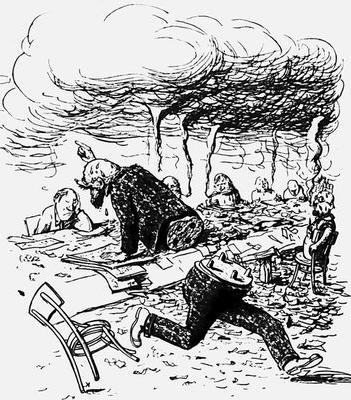Vladimir Mayakovsky, as you know, unconditionally accepted the revolution and welcomed the nascent socialist system. However, observing reality, he noted with chagrin the “diseases” of the new formation. One of them was total Soviet bureaucracy, which Mayakovsky did not expect from the new government. The poem "Passing by" is his answer to the current situation.
The face of the bureaucracy
The word "bureaucracy" came from the merger of two nouns - the French "office" and the Greek "power". This phenomenon exists wherever government exists. Bureaucratism (or bureaucracy) is called the immensely complicated movement of papers at the instances and desks of officials.
An analysis of Mayakovsky’s poem “Passing by” helps to see the guise of “paper power” through the prism of lyrical perception, which makes the picture extremely expressive. To some extent, the poet’s hostility to clerical paraphernalia can be explained by a personal drama: his father died from blood poisoning, which followed after he pricked his finger with a needle, stapling papers. And of course, circular red tape touched the poet himself when he bothered to publish his play Mystery Buff. There were notes in which Mayakovsky told how he was faced with "bureaucracy mixed with mockery."
Analysis of the poem “Passing by”: plot
![], analysis of Mayakovsky’s poem](//fb.ru/misc/i/gallery/13848/363636.jpg?1396264168019)
The hero of the work in the early morning (“a little night will turn into dawn”) is trying to get an appointment with the head of “Ivan Vanych”, this, of course, is a generalized image of all officials. This is far from the first attempt: “I have been walking since the time” (this is a book Slavic expression meaning “once very, very long time ago”). But the boss is constantly sitting somewhere. In the eyes of the lyrical hero, a bureaucratic whirlwind takes place: every day the employees are overwhelmed by the “rain” of “paper cases” (here the author uses a hyperbole), and they constantly go to meetings. The poet satirically comprehends the topics of these meetings, the discussed issues of which are ridiculous: “buying an ink bottle with a Gubkooperativ” or simply awkward: “the union of Theo and Gukon” (TEO is the abbreviation for the name “Theater Department of the People's Commissariat of Education”, and GUKON is the Main Directorate of Horse Breeding of the People’s Commissariat)
. Mayakovsky’s satirical pen includes his favorite Soviet acronyms, which he rhymes in a witty line: “At a meeting of A-be-ve-ge-de-e-zee-com.”
Idea and mood
The analysis of Mayakovsky’s poem “Passing by” is especially interesting from the point of view of developing the author’s mood. At first it is restrained, the hero reverently inquires of the secretary regarding the official: “Can they give an audience?” However, he was denied. And after “you have traveled a hundred staircases”, you already have “the light is not nice.” The author does not directly state his condition, but the vocabulary used uniquely paints a portrait of a tormented, miserable petitioner.

After another unsuccessful attempt to break through to the official (already “looking at the night”), the mood of the lyrical hero changes drastically, he is “furious” “bursting into the office of those sitting in an avalanche, and also“ wild curses spewing his way ”. Epithets, as we see, are very expressive! And here is a terrible scene in front of the hero: "half the people are sitting." Not daring to believe his eyes, he, like any normal person, is frightened and alarmed: “I’m scampering, yelling”, he “has lost his mind from a terrible picture”. But the secretary's equanimity seems especially sinister, who routinely states: "He is at two meetings at once." Why be surprised? There are so many meetings that you have to break between them: "... to the waist here, and the rest is there!" Hyperbole grows into a grotesque and turns the story into a phantasmagoria. The poem ends the unrealizable dream of the lyrical hero that the counselors gather at the meeting “Concerning the Eradication of All Meetings”. The poet ironically utters it in an intentionally clerical style.
Genre analysis of Mayakovsky’s poem “Passing by”
There is no doubt that the poem is sustained in the genre of satirical feuilleton. It, as befits a feuilleton, sharply ridicules the vices of society, has journalism and artistic merits. The author does not skimp on hyperbolization and grotesque, capacious metaphors and biting epithets. Many expressions, as well as the name of the poem, became common nouns during the life of the poet and tightly entered the treasury of the spoken language. The linguistic and innovative research of the poet is also associated with the feuilleton genre, as evidenced by the analysis of the verse “Passing by”.
Mayakovsky - futurist poet
The poet’s work fell on the days when not only the political system was broken , but also the language. Artists sought new means of expression, challenging tradition. The desire for novelty crystallized in the artistic direction of the beginning of the twentieth century - futurism, to which Mayakovsky enthusiastically joined. The analysis of the poem “Passing by” is therefore valuable from the point of view of the spectacular neologisms invented by the poet. According to the researchers, in the works of Vladimir Mayakovsky there are more than 2800 new lexical constructions. Before him, in Russian speech, no one heard the epithet "furious", as well as the infinitive "split up" or the participle "ory". And the word in the title of the work is an innovation that has no equal. The noun "sitting down" is a derivative of the verb "sitting down", which is also not in the Russian language. However, the connotation of the word is closely connected, for example, with the verb “lose” and has a hue of catastrophic excessiveness, hopelessness.

The compositional completeness of the poem
The work is written in a ring composition. We observe a diurnal cycle: from the morning of one day to the morning of another. The mood of the lyrical hero, as demonstrated by the analysis of the verse “Passing by,” corresponds to this cycle, the excitement intensifying in the ordeals of the hero and culminating in the scene where he sees half of the people, gradually subsides and transforms into reflection.